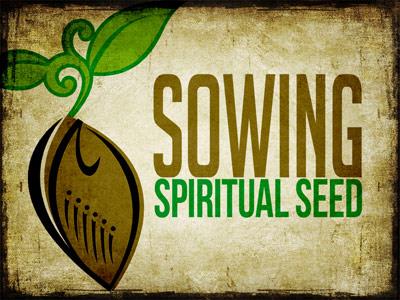-
How's Your Soil? Series
Contributed by Tom Fuller on Nov 28, 2017 (message contributor)
Summary: Jesus presents a familiar story with a real spiritual punch - take a listen and figure out if you are rocky, weedy, pathy, or pliable. It may be more significant than you ever dreamed.
Last winter I collected bags of leaves as a covering and mulch for our garden. I got the bags from a street corner where someone had raked them off their lawn. I spread them around and was satisfied. Then in the spring when it was time to plant our beans, pumpkins, tomatoes, and cucumbers, a strange crop had already sprung up all over the place—oak trees. It seems I had dutifully spread a bunch of acorns over the garden and they were now sprouting. I spent all spring and into the summer pulling oak trees out of our garden—if I hadn’t we would have had an oak grove instead of a place to grow food!
Even so, our garden didn’t turn out that well—parts were too wet, and the entire thing was too acidic so we ended up with weak plants and a low yield. The condition of the soil is crucial to gardening, and Jesus uses this as an illustration to say the condition of the heart is crucial to the receptivity of the gospel.
It’s interesting that Jesus went out “that same day”—leaving behind the Pharisees who rejected Him as the Messiah, and began to teach the people, who wondered if He could be the “son of David” (Matt 12:23).
Up until this point Jesus has taught pretty clearly. Now he begins to teach in parables—the reason for which he gives in verses 14 and 15. Basically they were designed to bypass people who had already made up their minds, and cause people who hadn’t to think a little.
The first parable is one of Jesus’ most famous: the Parable of the Sower. Now remember, parables are familiar stories with a spiritual or moral truth. They are not designed to “walk on all fours”—in other words you can’t interpret them literally, but must look at the point Jesus is making.
1 – 2
Jesus had had plenty of conflict—with the Pharisees who said He acted by Satan’s power and demanded a sign, and even his own family who thought He’d lost His mind. So He goes down to the shore of the Sea of Galilee, goes out from shore in a fishing boat, sits down, and teaches.
3 – 9
Farmers in Palestine at the time would plant their seeds by carrying a bag over their shoulders and flinging seeds in as many directions as possible so that hopefully enough would take root and produce a crop. All four of the soil types would be common in their fields so everything about the story was totally familiar to people in this agrarian society.
The variable in this story is the soil. The seed is the same. The farmer is the same, and the method of planting is the same. We’ll talk more about what all that means in a bit.
Along the paths—the roads went right through the fields. The hard, compacted soil would not allow the seeds to get any kind of a root and would end up sitting on top as a tempting treat for birds that flew by or small animals.
Rocky Ground – most of the soil in Palestine is filled with rocks. It was a farmer’s job to clear the field of rocks in order to plant, but often those rocks were merely piled to the side. In 2 Kings 3 when Elisha is delivering the word of the Lord to Jehoshaphat about Edom He told them to “… ruin every good piece of land with stones.” Rocky ground has a little soil which tends to collect a lot of moisture but the sun’s warmth dries up that moisture pretty quickly and since the plant can’t root down into anything, it dies.
Thorns – as many of us know, weeds tend to grow very well in a garden and will compete for light, moisture, nutrition, and space with the garden plants. If left untended, weeds often win.
Good Soil – good soil has depth, is free of competition and obstructions, gets light, water, and has qualities that make for growth, like a good ph balance. A farmer would be overjoyed to get a tenfold crop, but getting a hundred fold? That would be marvelous!
So now Jesus’ men come to Him and wonder, why all the veiled stories all of the sudden?
10 – 17
The parables were meant to get people thinking. But those whose hearts were already hardened to the gospel would simply dismiss them as being without meaning. But for those who wanted to dig deeper, the answer waited for them like a gold nugget in a stream. Jesus quotes Isaiah here, who faced a similar situation in his day—mainly that he was sent (“Here am I, send me”) with a message to a people who would reject it. Prophets like Isaiah wrote about the coming of the Messiah, but didn’t fully understand it. And even though the disciples in Jesus’ time didn’t fully get it either, their willingness and openness was all that was needed.

 Sermon Central
Sermon Central



